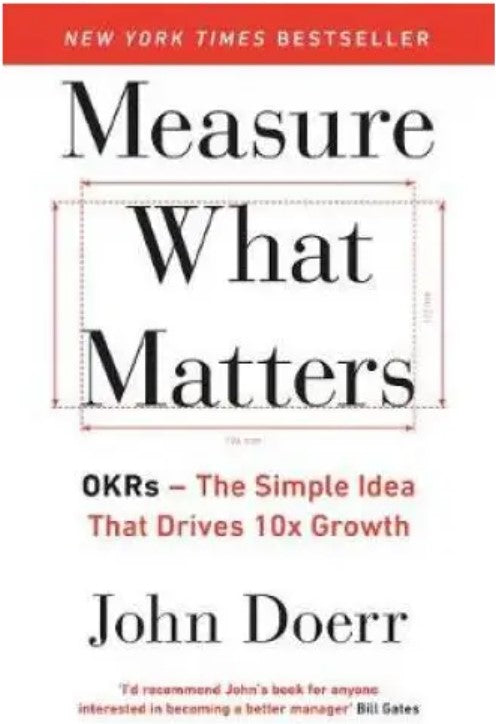
BOOK REVIEW: Measure What Matters AUTHOR: John Doerr
Share
"Measure What Matters" by John Doerr is a non-fiction book that delves into the world of goal-setting and organisational management. The book revolves around the concept of Objectives and Key Results (OKRs), a framework for defining and tracking objectives and their outcomes. The setting is not fictional but rather rooted in real-world corporate and organisational environments. Doerr introduces OKRs by drawing on various case studies from successful companies like Google, Intel, and Bono’s ONE Foundation. It's always great to know what the most successful companies and the rock stars are doing to uplevel, right?
John Doerr's writing style in "Measure What Matters" is clear, direct, and educational. He successfully breaks down complex business concepts into understandable segments, making the book accessible to a wide range of readers, from business professionals to those new to management concepts. The character development, in this case, refers to the evolution of companies and organisation's that implement OKRs. These 'characters' are well-defined, and their journeys through the implementation of OKRs are hell'a compelling and insightful.
The book's pacing is well-structured, offering a mix of theory, examples, and practical advice. The narrative is engaging, though some readers might find the detailed business examples to be somewhat extensive and very detailed. However, these examples are crucial in demonstrating the practical application of OKRs. In fact some I had to go over two or three times before my brain processed it enough to sink in...lol
Doerr’s use of language is effective, especially in the way he creates vivid imagery to explain OKRs. There are many memorable quotes, particularly his explanation of OKRs: "Ideas are easy. Execution is everything." This underscores the book’s emphasis on the importance of setting measurable goals.
Emotionally, the book is more thought-provoking than moving. It challenges readers to rethink their approach to goal setting and management. The most impactful moments are those where businesses transform radically by applying OKRs.
The central themes of "Measure What Matters" include goal setting, organisational efficiency, and the power of measurable objectives. Doerr aims to convey the importance of clear, transparent, and challenging goals, and he succeeds brilliantly in doing so. The book also contains implicit commentary on modern business practices and the need for innovation in management.
The strengths of the book lie in its clear explanations and real-world examples. However, its weakness might be a slight overemphasis on larger corporations, potentially making it less relatable for small business owners or startups, but there is still definitely implementation potential, once you wrap your mind about how it works.
I would recommend "Measure What Matters" to business leaders, managers, and anyone interested in organisational development or goal-setting techniques, especially when trying to ensure your whole team is on the same page across the organisation.
In comparison to other management books, Doerr's work stands out for its practicality and the successful track record of OKR's in major companies.
Rating: 4.5/5 Stars
John Doerr's writing style in "Measure What Matters" is clear, direct, and educational. He successfully breaks down complex business concepts into understandable segments, making the book accessible to a wide range of readers, from business professionals to those new to management concepts. The character development, in this case, refers to the evolution of companies and organisation's that implement OKRs. These 'characters' are well-defined, and their journeys through the implementation of OKRs are hell'a compelling and insightful.
The book's pacing is well-structured, offering a mix of theory, examples, and practical advice. The narrative is engaging, though some readers might find the detailed business examples to be somewhat extensive and very detailed. However, these examples are crucial in demonstrating the practical application of OKRs. In fact some I had to go over two or three times before my brain processed it enough to sink in...lol
Doerr’s use of language is effective, especially in the way he creates vivid imagery to explain OKRs. There are many memorable quotes, particularly his explanation of OKRs: "Ideas are easy. Execution is everything." This underscores the book’s emphasis on the importance of setting measurable goals.
Emotionally, the book is more thought-provoking than moving. It challenges readers to rethink their approach to goal setting and management. The most impactful moments are those where businesses transform radically by applying OKRs.
The central themes of "Measure What Matters" include goal setting, organisational efficiency, and the power of measurable objectives. Doerr aims to convey the importance of clear, transparent, and challenging goals, and he succeeds brilliantly in doing so. The book also contains implicit commentary on modern business practices and the need for innovation in management.
The strengths of the book lie in its clear explanations and real-world examples. However, its weakness might be a slight overemphasis on larger corporations, potentially making it less relatable for small business owners or startups, but there is still definitely implementation potential, once you wrap your mind about how it works.
I would recommend "Measure What Matters" to business leaders, managers, and anyone interested in organisational development or goal-setting techniques, especially when trying to ensure your whole team is on the same page across the organisation.
In comparison to other management books, Doerr's work stands out for its practicality and the successful track record of OKR's in major companies.
Rating: 4.5/5 Stars